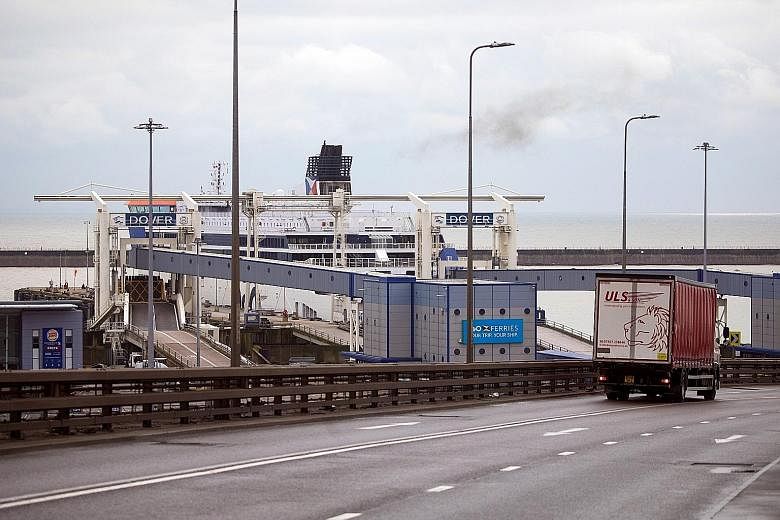LONDON • While the long lines of trucks have dissipated at ports, British businesses are waking up to less visible forms of friction at the border with the European Union that may cause more enduring damage.
From health certificates to new taxes and additional paperwork, the cost of moving goods across the English Channel is rising due to Britain's exit from the EU.
Just 6 per cent of companies told the Bank of England they were fully prepared for what was to come, and the headaches are starting less than two weeks into the new system.
While each of the new rules marks a minor shift from the border-free trade Britain enjoyed for four decades as a member of the EU, together, they add up to a significant constraint that is starting to upend supply lines and limit shipments for companies of all sizes.
Those hit hardest are the United Kingdom's 5.9 million small and medium-sized businesses, which employ about three in five of those working in the private sector.
"There's so much complexity," said director-general of the British Chambers of Commerce Adam Marshall. "It's like an onion - the more you peel, the more you cry."
Here are some of the biggest irritations hitting businesses because the UK is no longer a member of EU's single market and Customs union:
RULES OF ORIGIN
British firms post-Brexit must show where their goods are made - and where the components in those products come from - to determine if they must pay value-added tax (VAT) when resold into the EU. The answer determines whether they qualify for tariff-free treatment.
Those regulations do not exist for trade within the EU, making the old system far simpler.
Confusion about the rules has already prompted complaints from big-name retailers such as the Marks & Spencer Group.
Others have suspended sales to the EU. Debenhams temporarily switched off its Irish e-commerce site, while John Lewis Partnership, Asos, and Fortnum & Mason stopped deliveries to Ireland.
"Businesses have been completely blindsided by the 'rule of origin' part of the deal, which leaves them at a major competitive disadvantage when selling in the EU," said Ms Michelle Dale, senior manager at accountancy group UHY Hacker Young. "Unfortunately, not enough was done to prepare them."
VAT
British exporters must register to pay VAT in EU nations. That is prompting a number of companies to halt their cross-border trade, said Mr Stuart Lisle, chairman of the Brexit task force at professional services firm BDO.
"If we want to keep selling to customers from any EU state from our stocks in the UK, we must VAT-register in each target country immediately," said Ms Jennie Potts, co-founder of Mama Bamboo, which sells eco-friendly disposable nappies and wet wipes. "If we don't, we will trigger immediate liabilities."
Mr Lisle said many of his clients have not had to face those issues before, and that the added costs and complexities "can be very expensive to administer".
HEALTH CHECKS
The Brexit deal did not align rules for cross-border shipments of phytosanitary products, which cover plants and seeds. Farm goods qualify for zero-tariff, zero-quota terms, but that does not apply to live plants.
For Mr Andrew Skea, director of Potato House in Dundee, Scotland, that effectively means the EU is not accepting his seed potatoes. The product has been grown in Scotland for more than 100 years, and half of Mr Skea's sales are in the EU.
"Until now, the EU has been a domestic market for us," he said. "Now we'll need phytosanitary certificates, and the paperwork's going to have to accompany every order."
RED TAPE AND PAPERWORK
To simplify the forms they must file, some shippers are now refusing to carry loads containing a mix of products from different companies, according to trade body Scotland Food and Drink. That disproportionately hurts companies shipping in smaller quantities.
Another issue is that the terms of the deal were announced only days before the deadline for compliance.
"If you're... issuing guidance hours before the end of the transition period and businesses are busy dealing with the pandemic, things will start to fall apart - and they are starting to fall apart," said Mr James Withers, chief executive of Scotland Food and Drink, which is asking the government to request a grace period on enforcement by the EU until July.
PORT DELAYS AND COSTS
The cost of shipping goods across the border is rising, with delays at ports and some trucking companies reluctant to deal with the hassle.
"Things keep getting stuck," said Mr Oliver Conger, managing director of Rototherm Group, a maker of sensors and personal protective equipment. "I'm now having to buy up what stock there is in the UK at three times the price."
Tough new Covid-19 lockdowns that shut non-essential businesses are not helping. Four in 10 companies said their cash flow deteriorated in the fourth quarter of last year, with the very smallest hit even harder, according to a British Chambers of Commerce survey.
"Thousands of small firms need to invest in tech, advice and operational adjustments in order to keep trading across the EU, but don't have the cash needed to do so," said Mr James Sibley, who follows international affairs at the Federation of Small Business.
DUELLING CERTIFICATIONS
Products sold in the EU require a CE, or Conformite Europeenne, mark showing they meet health, safety and environmental standards. The UK will develop its own certification, meaning companies selling in both regions need to register for both standards.
"It's such a ridiculous level of duplication," Ms Renee Watson, founder of The Curiosity Box, a subscription service that teaches children about science. With annual sales of £500,000 (S$903,000), the company must spend £20,000 on new safety marks to sell in the Netherlands, France and Germany.
Ms Watson identified 26 areas of her business that would be affected by Brexit. "I've struggled to allocate that much time."
BLOOMBERG

